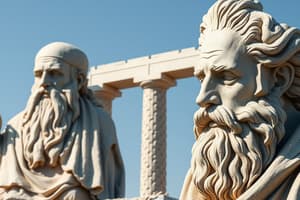Podcast
Questions and Answers
What does Socrates claim about knowledge?
What does Socrates claim about knowledge?
- To know is to know everything.
- I know that I know nothing. (correct)
- Knowledge is power and should be utilized.
- The only true knowledge is self-knowledge.
What does the term 'Metaphysics' refer to in philosophy?
What does the term 'Metaphysics' refer to in philosophy?
- The analysis of language and meaning.
- The study of reality, being, or existence. (correct)
- The examination of logical arguments.
- The study of moral values and ethics.
Which of the following best describes 'Analysis' in philosophical terms?
Which of the following best describes 'Analysis' in philosophical terms?
- The act of debating opposing viewpoints for resolution.
- The process of justifying a belief based on traditions.
- Combining different beliefs into a cohesive framework.
- Understanding an idea by distinguishing its components. (correct)
What does 'Synthesis' involve in the context of philosophy?
What does 'Synthesis' involve in the context of philosophy?
What is an essential aspect of building an 'Argument' in philosophy?
What is an essential aspect of building an 'Argument' in philosophy?
What does the fallacy Argumentum ad Tradition assume?
What does the fallacy Argumentum ad Tradition assume?
What is an example of the fallacy of Division?
What is an example of the fallacy of Division?
What does the Hasty Generalization fallacy involve?
What does the Hasty Generalization fallacy involve?
What characterizes the fallacy of Equivocation?
What characterizes the fallacy of Equivocation?
Which statement exemplifies Cause and Effect fallacy?
Which statement exemplifies Cause and Effect fallacy?
In the fallacy Petitio Principii, what is incorrectly assumed?
In the fallacy Petitio Principii, what is incorrectly assumed?
What is a characteristic of the fallacy of Hasty Generation?
What is a characteristic of the fallacy of Hasty Generation?
Which statement is an example of an Argumentum ad Tradition?
Which statement is an example of an Argumentum ad Tradition?
What does the disembodied spirit view suggest about the human person?
What does the disembodied spirit view suggest about the human person?
According to Aristotle, what is the relationship between the body and the soul?
According to Aristotle, what is the relationship between the body and the soul?
What concept did Rene Descartes introduce regarding the relationship between body and spirit?
What concept did Rene Descartes introduce regarding the relationship between body and spirit?
What does the vegetative/nutritive soul enable plants to do?
What does the vegetative/nutritive soul enable plants to do?
How does Plato's belief in immortality relate to his views on knowledge?
How does Plato's belief in immortality relate to his views on knowledge?
What is the embodied spirit view's perspective on the human person?
What is the embodied spirit view's perspective on the human person?
What role does the sensitive soul play in the life of animals?
What role does the sensitive soul play in the life of animals?
Which philosopher argued for the idea that souls are immaterial and cannot decompose?
Which philosopher argued for the idea that souls are immaterial and cannot decompose?
What does ethics primarily study?
What does ethics primarily study?
Which philosopher is associated with the quote regarding limited time?
Which philosopher is associated with the quote regarding limited time?
What is the focus of political philosophy?
What is the focus of political philosophy?
What does aesthetics study?
What does aesthetics study?
Gabriel Marcel’s philosophy emphasizes what kind of reflection?
Gabriel Marcel’s philosophy emphasizes what kind of reflection?
What is one aspect of philosophy mentioned in the content?
What is one aspect of philosophy mentioned in the content?
The Husserlian phenomenological method was developed by which philosopher?
The Husserlian phenomenological method was developed by which philosopher?
What does the articulation process in philosophy involve?
What does the articulation process in philosophy involve?
What is emphasized in the view of embodied spirit regarding human nature?
What is emphasized in the view of embodied spirit regarding human nature?
Who suggested that the key to personhood is sentience?
Who suggested that the key to personhood is sentience?
According to the existential approach, what does a human being possess?
According to the existential approach, what does a human being possess?
What does the 1987 Constitution's Section 12, Art II emphasize about human life?
What does the 1987 Constitution's Section 12, Art II emphasize about human life?
What aspect distinguishes humans from other animals, according to the text?
What aspect distinguishes humans from other animals, according to the text?
What does the term 'work-in-progress' signify about human beings?
What does the term 'work-in-progress' signify about human beings?
What aspect does the statement 'Man exists in a world' highlight?
What aspect does the statement 'Man exists in a world' highlight?
Which view acknowledges opposing views while emphasizing the value of the body?
Which view acknowledges opposing views while emphasizing the value of the body?
Flashcards are hidden until you start studying
Study Notes
Philosophy
- A search for answers to life's big questions, concerning our knowledge, actions, and beliefs.
- The process of understanding and questioning ideas we often take for granted.
Branches of Philosophy
- Metaphysics: The study of reality, existence, and being.
- Epistemology: The study of knowledge and how we acquire it.
- Ethics: Moral philosophy - exploring right and wrong.
- Social Philosophy: Philosophical study of society and its structures.
- Political Philosophy: Focuses on the state and its role in society.
- Logic: The study of reasoning and argumentation
- Aesthetics: The philosophical study of beauty and art.
Key Philosophers
- Socrates: Known for his questioning approach and the famous phrase "I know that I know nothing." He believed an unexamined life is not worth living.
- Plato: Argued for the immortality of the soul and the concept of "recollection," where we learn by remembering what we once knew.
- Aristotle: Defined the soul as the principle of life, and viewed the soul as a form or structure that brings life to matter. He identified three types of souls: vegetative, sensitive, and rational.
- Rene Descartes: Introduced Substance Dualism, suggesting that an immortal spirit can survive without a body, but a mortal body cannot survive without the spirit.
- Edmund Husserl: Developed the Husserlian phenomenological method - a philosophical approach aimed at understanding the essence of phenomena.
- Gabriel Marcel: Differentiated between primary and secondary reflection, advocating for a deeper and more personal understanding of the human being.
- Jean-Paul Sartre: Emphasized the existence of the individual as a free and responsible agent in a world of possibilities.
Perspectives on the Human Person
- Disembodied Spirit View: Asserts that the human essence is their spirit, viewing the body as nonessential.
- Embodied Spirit View: Maintains that the human person is a unity of body and spirit, recognizing the value of both.
- Unspirited Body View: Argues that the human person is essentially just their body, with no spiritual component.
Key Concepts & Terminology
- Transcendence: The ability to move beyond one's current situation, a characteristic of human beings according to existential philosophy.
- Person: A being who is part of our moral community, deserving of respect and consideration.
- Human: A member of the species "Homo sapiens", distinguished by superior mental development, language, and upright posture.
Fallacies in Reasoning
- Petitio Principii (Begging the Question): A fallacy where the conclusion is assumed in the premises, creating a circular argument.
- Argumentum ad Tradition / Antiquitatem (“Appeal to Tradition"): Claims something is valid simply because it has been practiced for a long time.
- Hasty Generalization: Reaching a conclusion based on insufficient evidence.
- Fallacy of Division: Assuming what's true of a whole must also be true of its parts.
- Fallacy of Equivocation: Using the same term with different meanings in different parts of an argument.
Additional Key Points
- The "embodied spirit view" is considered the most favorable, as it maintains human freedom, acknowledges the soul, and respects the value of the body.
- Philosophy encourages us to examine our lives and challenge our beliefs to achieve truth.
- Philosophy helps us analyze our experiences and reflects on their meaning.
- The 1987 Philippine Constitution emphasizes the state’s responsibility to protect life, including the life of the unborn.
Studying That Suits You
Use AI to generate personalized quizzes and flashcards to suit your learning preferences.




